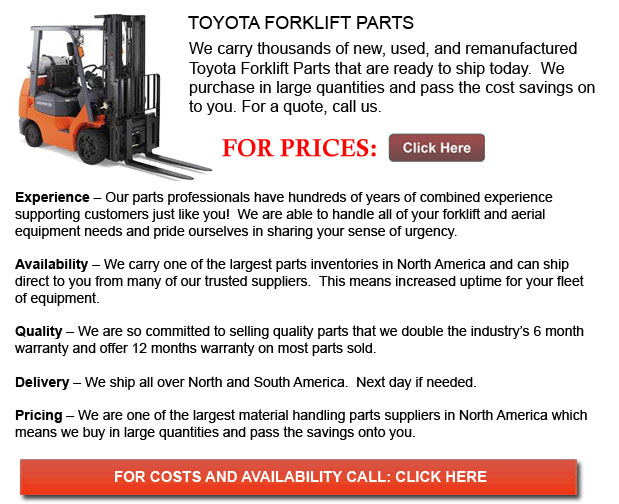
Toyota Forklift Parts - Ever since 1992, Toyota Material Handling inc., U.S.A., also known as TMHU, has been the top selling lift truck provider in the U.S. Proudly celebrating more than 40 years of operations, the Irvine, California established company presents a wide-ranging line of quality lift vehicles. Resulting from their status of excellence, reliability, and durability, Toyota remains popular in this aggressive market. Quality is the keystone of Toyota's legendary Toyota Production System practiced at all manufacturing facilities, including TIEM, which is stands for Toyota Industrial Equipment Manufacturing, situated in Columbus, Indiana. The bulk of the Toyota lift trucks sold in the U.S. are built here.
All Toyota's manufacturing plants within Canada and the U.S. comply with the International Organization for Standardization or ISO 14001 standard. TIEM has been honored many times for its dedication to constant development, and its environmental systems. It is the first and only manufacturer to offer EPA and CARB-certified Compressed Natural Gas powered lift trucks on the market. For example, the Toyota 8-Series IC lift trucks emit 70 percent less smog forming emissions than the current federal EPA standards and have complied with California's strict emission standards and regulations.
Toyota Material Handling, U.S.A. - The Industry Leader
Brett Wood, President of TMHU, associates Toyota's achievement to its stout dedication to manufacture the best quality lift vehicles while delivering the utmost client service and assistance. "We must be able to learn and predict the needs of our customers," said Brett Wood. "As a leader, our success also depends on our ability to address our customers' operational, safety and environmental cost issues." TMHU's parent company, Toyota Industries Corporation, also known as TICO, is listed in Fortune Magazine as the world's leading lift truck dealer and is among the magazines prestigious World's Most Admired Companies.
Redefining Environmental Accountability
Toyota Industries Corporation, as the parent company, has instilled a rich company doctrine of environmental stewardship in Toyota. Not a lot of other organizations and no other lift truck producer can match Toyota's record of protecting the natural environment while concurrently advancing the economy. Environmental responsibility is a fundamental characteristic of company decision making at Toyota and they are proud to be the first and only producer to offer UL-listed, EPA- and CARB-certified Compressed Natural Gas powered lift vehicles. Yet an added reason they remain a leader within the industry.
In 2006, Toyota introduced the 8-Series line. The 8-Series signifies both Toyota's innovation and leadership in the industry. It features an exclusive emission system that surpasses Federal EPA emission standards, and also meets California's more involved 2010 emission standards. The end invention is a lift truck that creates 70% less smog forming emissions than the current Federal standards tolerate.
Furthermore in 2006, Toyota developed a partnership with the Arbor Day Foundation, furthering their commitment to the environment. In excess of 57,000 trees have been planted in district parks and national forests damaged by environmental causes such as fires, as a result of this relationship. 10,500 seedlings have also been circulated through Toyota Industrial Equipment's network of sellers to non-profit organizations and local customers to help sustain communities all over the U.S.
Toyota's lift trucks provide superior productivity, visibility, ergonomics and resilience, and most importantly, the industry's leading safety technology. The company's System of Active Stability, also referred to as "SAS", helps lessen the risk of mishaps and accidental injuries, in addition to increasing productivity levels while minimizing the likelihood of product and equipment damage.
System Active Stability can sense factors that may lead to lateral volatility and possible lateral overturn. When any of these factors have been sensed, the SAS will instantaneously engage the Swing Lock Cylinder to re-stabilize the rear axle. This transitions the lift truck's stability footprint from triangular in shape to rectangular, providing a major increase in stability which substantially reduces the probability of an accident from a lateral overturn. The Active Mast Function Controller or the Active Control Rear Stabilizer also assists to prevent injuries or accidents while adding durability.
The SAS systems were originally adopted on the 7-Series internal combustion lift vehicles which were put on the market in 1999. These systems helped push Toyota into the lead for industry safety standards. Now, SAS is used on almost every modern internal combustion models and is standard equipment for the new 8-Series. There are more than 100,000 SAS-equipped lift vehicles in operation, exceeding 450 million hours combined. The increased population of SAS-equipped trucks in the field, along with obligatory operator training, overturn fatalities across all brands have decreased by 13.6% since 1999. Also, there have been an overall 35.5% decrease in industry wide collisions, loss of control, falls and tip overs from a lift vehicle for the same period.
Toyota's measure of excellence reaches far beyond its technological achievements. The company maintains a widespread Operator Safety Training program to help consumers meet OSHA standard 1910.178. Education programs, video tutorials and a variety of materials, covering a broad scope of subjects-from personal safety, to OSHA rules, to surface and cargo conditions, are accessible through the seller network.
Ever since the sale of its first lift truck in the U.S. to the construction of its 350,000th lift truck produced in 2009 at Toyota Industrial Equipment Manufacturing, TMHU has maintained a unbroken existence in the U.S. This fact is demonstrated by the statistic that 99% of Toyota lift trucks bought in America now are manufactured in the United States.
TMHU is situated in Columbus Indiana and houses nearly 1 million square feet of production facilities over 126 acres of land. Facilities include a National Customer Center, as well as manufacturing operations and distribution centers for equipment and service components, with the whole commitment exceeding $113 million dollars.
The new National Customer Center was conceived to serve both sellers and clients of TMHU. The facility includes a 360-degree display room, a presentation theater complete with stadium seating for 32, an area for live merchandise demonstrations with seating capacity for 120; a presentation theater; Toyota's Hall of Fame showcasing Toyota's story since the birth of its creator, Sakichi Toyoda, in 1867, and finally a education center.
TMHU has 68 sanctioned industrial equipment dealers, along with 189 dealership locations all through the United States, offering the most comprehensive and inclusive consumer support and customer service in the industry. The company's new and Certified Used lift vehicles, service, components, and financing features make Toyota dealerships a one-stop shop to guarantee total customer satisfaction.
![]() Click to Download the pdf
Click to Download the pdf
Forklift Parts
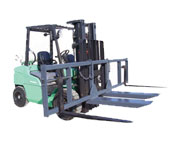
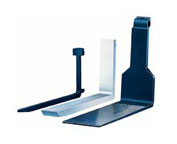
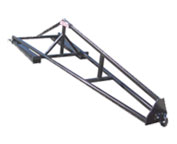
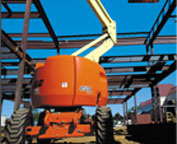

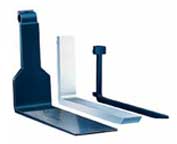
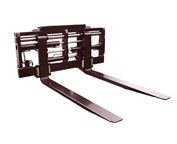

Lift Parts Express
TOLL FREE: 1-888-695-7994
North Vancouver, British Columbia
forkliftpartsnorthvancouver.ca
Email Us
About Us


